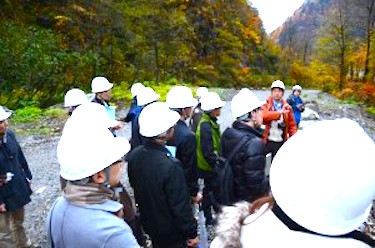

Master’s Program in Environmental Sciences
A distinctive feature of this program is its focus on interdisciplinary education and investigation of the environment. In order to foster outstanding environmental practitioners the program offers lectures and field exercises, providing students with a general background in the fundamentals of different disciplines. This program offers interdisciplinary courses in which students gain analytical skills in the natural sciences, humanities and social science methodology, practical fieldwork techniques and experimental skills through hypothesis testing and field/laboratory work.
Students undertake research under the supervision of a mentors committee which consists of faculty members. With the approval of the committee members students begin their research based on the proposal. In the middle of the second year students make an interim presentation of their research. The mentors committee reviews the progress of each student and gives both advice and supervision towards the completion of the thesis. Students submit their Master’s thesis and undergo a final oral examination. Students who successfully defend their thesis and who have acquired the prescribed credits (more than 30 credits) are awarded a Master’s Degree in Environmental Sciences. Students are expected to add new knowledge to the environmental studies field through the completion of their research and thesis. The duration of the Master’s course is normally two years, however early completion is also available if the student satisfies all the requirements in less than two years.
Read more: Curriculum & Syllabus
Doctoral Program in Sustainable Environmental Studies
The program provides the means to intensify research in interdisciplinary and sustainable environmental by studies. There are three focal areas of the program. The first is to foster scientific and analytical skills while undertaking introspective studies in the humanities. The second is to gain practical skills through field work and in situ study methods, which provide a better understanding of practical problems. The third focus is on the hypothetical-deductive method and the development of student laboratory skills in both practical and experimental analysis. Finally, this program strengthens a student’s ability to apply the above mentioned knowledge and methods to clarify or resolve an issue within the wider academic community. It also concentrates on the practical contribution that can be made to the real world in the future through the evaluation of environmental issues and the offering of strategies to solve or mitigate these problems. It also aims to foster professionals educated in an interdisciplinary setting including the development of skills in public interaction, presentation and international relations who are capable of offering practical solutions to these environmental problems.
Each student is supervised by an advisory committee, which contains one academic supervisor and at least two co-supervisors. Students are required to participate in two out of three forums, offered by different research fields. These forums are conducted in English and are designed to intensify their interdisciplinary research skills through presentation and discussion. The option is provided to undertake a long-term internship to improve students’ practical and social skills through arrangement with their supervisor in advance. The advisory committee gives students both advice and supervision toward the completion of their Doctoral thesis and evaluates the student’s thesis proposal, research progress and research achievement via public presentation and scrutiny. Once students pass sustainable environmental studies exercises (I, II and III), they may submit the Doctoral thesis. Students make a public presentation as a preliminary evaluation and then defend their thesis in front of a thesis examination committee, which consists of one chief examiner and at least two co-examiners. The students are also required to have at least one journal publication. After the students pass the defence, the thesis evaluation committee evaluates the thesis and awards the Doctoral Degree. The doctoral thesis must contribute new knowledge to the field of sustainable environmental studies and must have been completed through independent study and research. The duration of the doctoral course is ordinarily three years however early completion is also available if the student satisfies all the requirements in less than three years.
Read more: Curriculum & Syllabus
Cooperative Graduate School System
The master’s program in environmental sciences and the doctoral program in sustainable environmental studies set up collaborative research program and student direction with other Institutes in order to conduct wide-ranging education. The cooperative graduate school system has been formed with National Institute for Environmental Studies (NIES) to deal with the environmental problems expanded and complicated. NIES constantly conducts excellent research study, keeping close connection with administration and industrial company, and at the same time accumulates wide-ranging data and findings. It is certain that this collaboration improves interdisciplinary and practical education, providing students with stimulus opportunity. The cooperative graduate school system accepts 2 students in each program (master’s and doctoral programs), which provides Regional Air Pollution. The field is composed of two professors and one associate professor who direct their student’s research study. Students, along with completing necessary credits, submit the degree thesis, and accepted both by the preliminary examination committee and by the thesis examination committee and then are awarded the Degree, either Master’s Degree or Doctoral Degree.
- Regional Air Pollution(SUGATA Seiji, Associate Professor and NAGASHIMA Tatsuya, Associate Professor, 1 Student in each program in environmental sciences and in sustainable environmental studies) Study on emission sources of air pollutants such as NOx and aerosols related to urban or rural air pollution, dynamics of pollutants in the atmosphere, as well as developments in the estimation/evaluation methods of various mitigation measures will be made.

